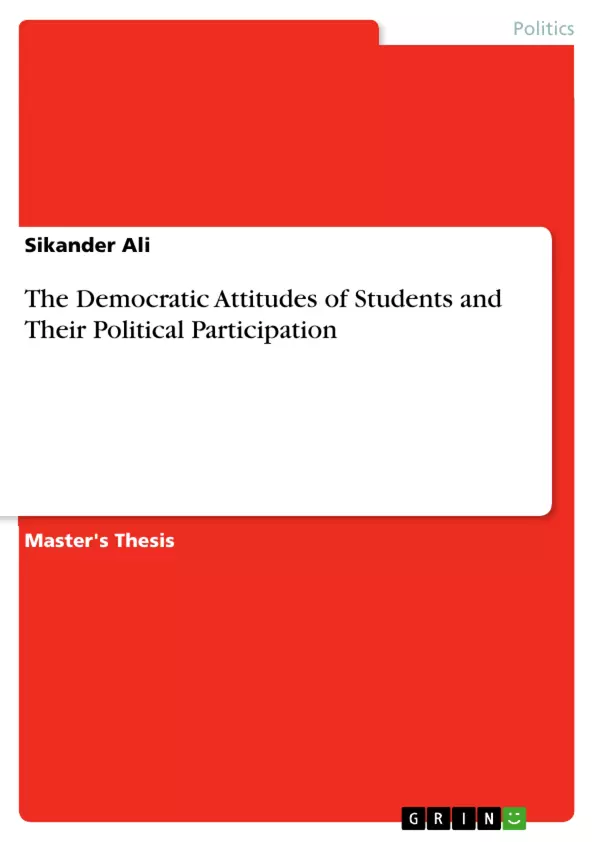This research aims to find out the democratic attitudes of students and their participation in politics at Quaid-i-Azam University, Islamabad. The study focuses on the students' perceptions towards the country’s political issues, the democratic attitudes and the impact of religious orientations on democratic attitudes of young students.
The researcher used a survey method in which questionnaires were distributed among the sample. The sample size was 225 which included the respondents from all the provinces and regions of Pakistan. The researcher used SPSS as the tool for data analysis and Chi-square and Phi-coefficient tests were applied to check the relations among the variables. The overall result shows that young students neither have democratic attitudes nor participate in to political activities.
Inhaltsverzeichnis (Table of Contents)
- INTRODUCTION
- Statement of Problem
- Object of Study
- Sociological significant of study
- LITERATURE REVIEWED
- Student politics in Pakistan (A Historical Back ground)
- Student Politics in Developed and Developing countries
- Family influence on Student politics
- Student Leftist Political Wing
- Political Socialization of Students
- Democratic Attitude of Students
- Assumption
- THEORETICAL FRAMEWORK
- The Minimax Strategy
- Application of Theory
- The Power Elite Theory
- Application of Theory
- The Deferential Association Theory
- Application of theory
- Preposition
- Hypothesis
- Democratic Attitude
- Political Participate
- CONCEPTUALIZATION AND OPERATIONALIZATION
- Conceptualization
- Democratic
- Attitudes
- Student
- Religious
- Orientation
- Political
- Interest
- Operationalization
- Democratic Attitude
- Student
- Religious Orientation
- Political Interest
- Conceptualization
- METHODLOGY
- Research design
- Universe of the Study
- Unit of Analysis
- Targeted population
- Sampling techniques
- Sample size
- Tool for data collection
- Techniques for data collection
- Pre-Testing
- Data analysis
- Screening and transformation of data
- Reliability and validity in research
- Opportunities and limitation of study
- Ethical concern
- RESULTS
- Descriptive Analysis
- Inferential Statistics
- Hypothesis Testing
- DISCUSSION AND CONCLUSION
- Discussion
- REFERENCE
Zielsetzung und Themenschwerpunkte (Objectives and Key Themes)
This study aims to explore the political participation of students in Pakistani educational institutions. It investigates the factors that influence their political attitudes, behaviors, and participation levels. The study analyzes the role of family, social, and political factors in shaping student political views and actions. The research also explores the relationship between students' political participation and their academic performance and future aspirations.
- Student political participation in Pakistan
- Factors influencing student political attitudes and behaviors
- The impact of family, social, and political factors on student political views
- The relationship between student political participation and academic performance
- Student political participation and future aspirations
Zusammenfassung der Kapitel (Chapter Summaries)
- Chapter 1: INTRODUCTION: This chapter introduces the research problem, the object of study, and the sociological significance of the research. It outlines the context and importance of understanding student politics in Pakistan.
- Chapter 2: LITERATURE REVIEWED: This chapter reviews existing literature on student politics in Pakistan and other countries. It explores historical perspectives, international trends, and the influence of family and political socialization on student political participation.
- Chapter 3: THEORETICAL FRAMEWORK: This chapter presents the theoretical frameworks used in the study, including the Minimax Strategy, the Power Elite Theory, and the Deferential Association Theory. It explains how these theories provide a foundation for understanding student political behaviors and attitudes.
- Chapter 4: CONCEPTUALIZATION AND OPERATIONALIZATION: This chapter defines and operationalizes the key concepts used in the study, such as democratic attitudes, student characteristics, religious orientation, and political interest. It clarifies the definitions and measurements employed for data collection and analysis.
- Chapter 5: METHODLOGY: This chapter details the research methodology employed in the study, including the research design, sampling techniques, data collection methods, and data analysis procedures. It describes the steps taken to ensure the rigor and validity of the research findings.
- Chapter 6: RESULTS: This chapter presents the findings of the study, including descriptive analysis, inferential statistics, and hypothesis testing. It summarizes the data collected and the patterns observed in relation to the research questions.
Schlüsselwörter (Keywords)
The study focuses on student political participation, political attitudes, political socialization, family influence, democratic attitudes, political interest, academic performance, research methodology, descriptive analysis, inferential statistics, and hypothesis testing. These keywords encapsulate the core concepts and themes explored in the research.
Frequently Asked Questions
What is the main objective of the research at Quaid-i-Azam University?
The research aims to determine the democratic attitudes of students and their level of participation in political activities at the university.
What were the general findings regarding student political participation?
The overall result indicates that young students generally do not possess strong democratic attitudes nor do they actively participate in political activities.
Which theoretical frameworks were used to analyze student behavior?
The study utilized the Minimax Strategy, the Power Elite Theory, and the Deferential Association Theory to understand student political views.
How does religious orientation affect democratic attitudes?
The study specifically investigates the impact of religious orientations as a key variable influencing the democratic perceptions of young students.
What methodology was employed for data collection?
A survey method was used, distributing questionnaires to a sample of 225 respondents representing all provinces and regions of Pakistan.
What role does the family play in student politics according to the review?
The literature review explores family influence as a significant factor in the political socialization and attitude formation of students.
- Arbeit zitieren
- Sikander Ali (Autor:in), 2015, The Democratic Attitudes of Students and Their Political Participation, München, GRIN Verlag, https://www.grin.com/document/379571



